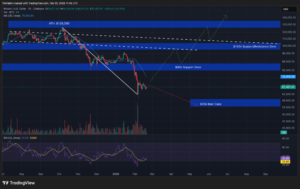Last updated:
 Why Trust Cryptonews
Why Trust Cryptonews

Florida resident Maria Vaca has filed a lawsuit against Google, alleging that the tech giant’s negligence led to her losing over $5 million.
Vaca’s lawsuit, filed in California, details how she was deceived by a crypto investment app called Yobit Pro, which she downloaded from the Google Play Store.
Vaca began investing in cryptocurrency through Yobit Pro between February and July 2023, pouring approximately $4.6 million into the platform.
Vaca’s Investments Grew to $7 Million
According to Vaca, the app initially showed her investments growing to an impressive $7 million.
However, when she attempted to withdraw her funds, she was informed that she needed to deposit an additional $500,000 to cover “taxes.”
After complying with this demand, Vaca grew suspicious when the app requested an additional $2 million.
Realizing she was being scammed, she refused to pay the additional amount.
The situation escalated when Vaca began receiving threatening messages via WhatsApp from unidentified cyber-criminals, demanding more money and even threatening her life.
Terrified and realizing the gravity of the situation, Vaca reported the scam to law enforcement and the Consumer Financial Protection Bureau (CFPB), which in turn contacted Google.
Despite the urgent complaint, Vaca’s lawsuit alleges that Google took three months to remove the fraudulent app from the Play Store.
Vaca is now seeking at least $5 million in damages from Google, reflecting her financial losses.
Her lawsuit claims that she trusted the app because it was available on the Google Play Store, believing Google’s platform was secure and free of scam apps.
The lawsuit accuses Google of “material misrepresentations and other deceptive conduct,” which Vaca alleges caused her significant financial, emotional, and psychological harm.
The lawsuit also notes that the ordeal led to the collapse of the real estate business Vaca had spent her life building.
Vaca’s case is not an isolated incident.
Her lawsuit points out that over 12,000 Android users downloaded Yobit Pro, with at least five other users reporting similar experiences.
Google Sues Developers of Fraduelent Apps
In April, Google sued two developers for creating 87 fraudulent apps that scammed over 100,000 users, including 8,700 U.S. residents.
Although Yobit Pro was not mentioned in Google’s lawsuit, the tactics described mirror Vaca’s experience.
These include fraudulent apps luring users with promises of high returns, only to demand additional payments under the guise of taxes or fees, with no intention of allowing users to withdraw their funds.
One of the apps included in the Google lawsuit was TionRT, which claimed to be a crypto exchange.
The app, uploaded to Google Play in 2022 by a developer account associated with Sun, used text messages and social media platforms to entice victims with promises of earning extra money.
Victims who were unable to withdraw their funds received no response from the scammers, leading to the eventual shutdown of the platform.
Meanwhile, Google has launched a feature allowing users to search balances of wallets on Bitcoin, Arbitrum, Avalanche, Optimism, Polygon, and Fantom blockchain.

















